Magento is a shopping cart platform built as an open source solution owned by eBay. The first place in this category is held by Wix which has a total score of 9.8/10 and is the winner of our Best Shopping Cart Software Award for Q1 of 2018. You can try out Wix for free here.
Powerful and robust with eCommerce features and tools, Magento provides businesses a tremendous amount of flexibility when it comes to configuring and taking total control of their stores. With its impressive track record plus its deep integration with eBay, it is no wonder that many businesses choose to build their stores with Magento.

You can utilize the Magento Enterprise Edition and Magento Community to create an individualized shopping experience for your customers. Plus, you can customize the back-end handling of your media content and inventory. Create a branded website for mobile devices and desktops. Add unlimited number of extensions built by the Magento community, offer vouchers, discounts, and recommendations, integrate your shopping cart with payment gateways, manage returns and stock levels, and automate the sending of newsletters, emails, and reminders.
Magento offers a wide range of digital marketing tools such as product reviews, rule-based cross-selling and up-selling, targeted promotions based on customer segmentation, and SEO recommendations. Enable your customers to search your online store based on category, color, and price. Provide them a recommendations engine and wish list. Finally, the Magento Enterprise Edition empowers you to create and manage multiple stores and custom landing pages with rich media features and images.
Features
- Web Design
- Shopping Cart
- Customer service
- Order Management
- Mobile Commerce
- Product Management
- Search Engine Optimization
- Marketing
- Analytics and Reporting
- Multiple Websites
More than 240,000 merchants all over the world rely on Magento’s powerful eCommerce platform and tools that enable them to achieve their goals by attracting more potential customers, turn prospects into sales, and increase their sales. Flexible and reliable, this solution empowers you to exercise absolute control over your online sales channel. You can leverage your online store with Magento’s enterprise-level functionalities and tools. The platform expands and scales effortlessly and quickly with your business. It provides the functionalities you need as your business grows. Finally, you can take advantage of the deep integration with eBay.
Tools
Magento Connect allows you to build extensions to enhance the shopping experience for your customers. Plus, you can improve management of your inventory and personal website. Magento SOAP v2 API enables you to customize the usability of your online store and shopping cart. You can test new tools, roll back changes, and work with sales orders, inventory, products, categories, and customers.
Mobility
Magento offers native mobile apps for Android and iPhone/iPad devices with mobile HTML5 interface. You can build a branded mobile site that connects with your website. Your customers can utilize swipe and zoom as well as drag-and-drop tools.
Segment Customers for Targeted Promotions
Segment your buyers based on demographic data as well as buying history, shopping cart, and user activity. Then, target specific consumers based on their buying history and provide them specific promotions, pricing, and content. Attach custom coupons and discount codes to newsletters and emails.
SEO Tools and Reliable Security
Magento produces SEO-friendly URLs, customized Meta descriptions and Meta keywords, and a Google site map. You can provide guaranteed security to your customers as all transactions are secured with robust data encryption. The platform supports a vast number of transactions per hour thanks to its persistent bandwidth and advanced full-page caching.
Themes & Designs
Magento – the main company – doesn’t offer any custom designs for your store. To get something quality and good-looking what you have to do is go to a third party. For locating a pre-built template to customize later on, check out the Magento Marketplace, which highlights nicely designed options from other design companies. Some of the themes on this page are given away for free, but I would expect to pay for the best.

This means either browsing the catalogue under Magento Connect, or you can go straight to ThemeForest and get a premium theme. Finally, if you know how, you can build a Magento theme yourself from the ground up.
Managing products
Setting aside all the technical difficulties during set-up, Magento is actually friendly to work with on a daily basis. The main dashboard is easy to grasp, with well-organized sections. The inventory is quite simple to get around, and you can add new products pretty easily.
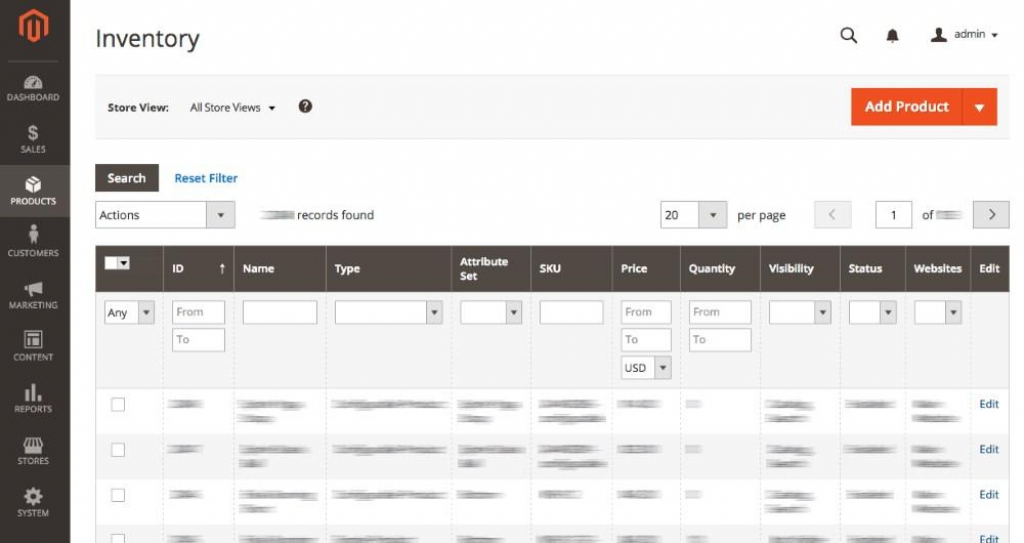
Magento inventory management allows for various modifications to keep up with which items are coming in and going out of your store. For example, you can check up on backordered items and change the numbers for minimum and maximum quantities. Sell downloadable products in your store; assign unlimited product attributes, and even moderate product tags and reviews to maintain full control over your own website.

When it comes to online payments, Magento lets you integrate with PayPal and Authorize.net out the gate, and it also offers multiple other payment extensions through Magento Connect. On top of that, you can experiment with things like one-click payments, guest checkouts, and more. You can also link to a wide variety of sales channels like eBay and Amazon. What’s great about the Magento integration is that your entire inventory is synced with the website. Therefore, your customers won’t be buying items that are out of stock and getting their hopes up.
Algorithms are used for making shipping and tax calculations. You can also give your customers some unique purchasing options such as an inventory site search and an instant purchase button. Global selling gives you quite the advantage as well, since you can support things like multiple currencies and languages.
SEO and Marketing
The cool thing about Magento is that you don’t really have to use other marketing tools to get everything you want, from email marketing to ads on the site. SEO is automatically configured, unless you want to go in and change things yourself. Marketing benefits include the ability to upsell products, offer promotional pricing and give out coupons. There is an email marketing platform and multi-tier pricing for quantity discounts, pushing people to buy a little more to reach those discounts. Some of the more advanced marketing features are still only reserved for those using Magento Commerce. A prime example of this would be the built-in customer loyalty tools. So, if you’re only working with Magento Open Source you’ll have to find an add-on or developer to build your own loyalty program. The main SEO features are as follows:
- Marketing, promotions, and conversions
- Site management
- Catalog management
- Catalog browsing
- Product browsing
- Checkout, payment, and shipping
- Order management
- Customer service
- Mobile commerce
- Persistent shopping
- Private sales
- Gift registries
- Store credits
Finally, mobile optimization and the standard SEO tools are included in both versions of Magento. So, you can rest easy knowing that the search engines are finding your site and everything is showing up nicely on smaller devices.
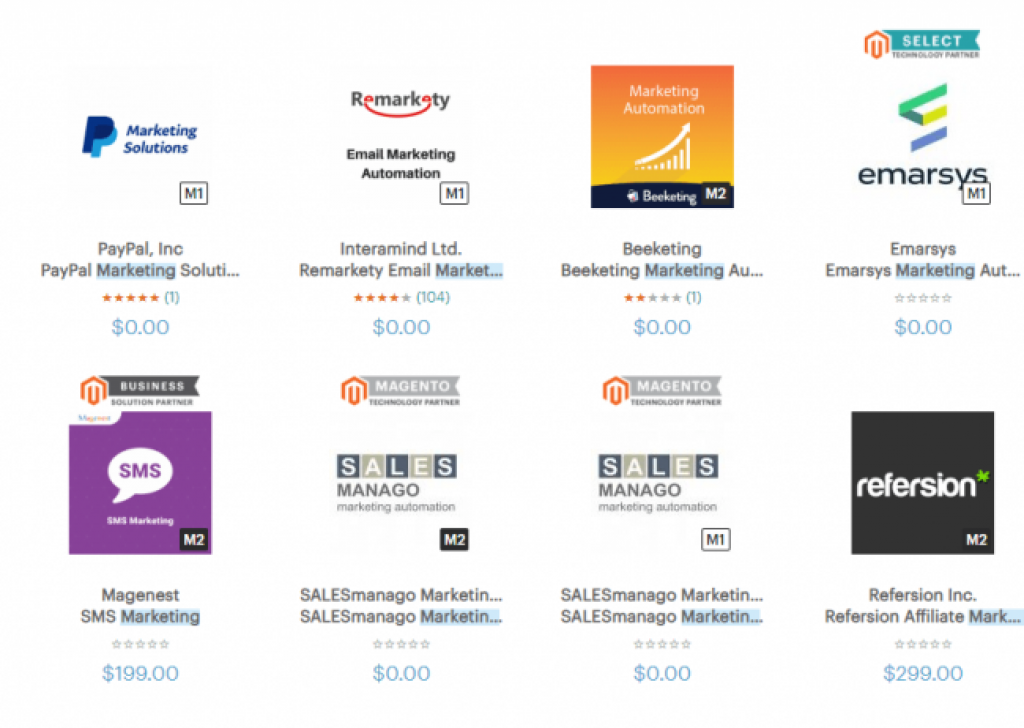
Payments
Magento provides one-click payments, guest checkouts, and shipping to other addresses, if needed. You can even set up a “bill me later” program to help out your customers and finance the purchases.
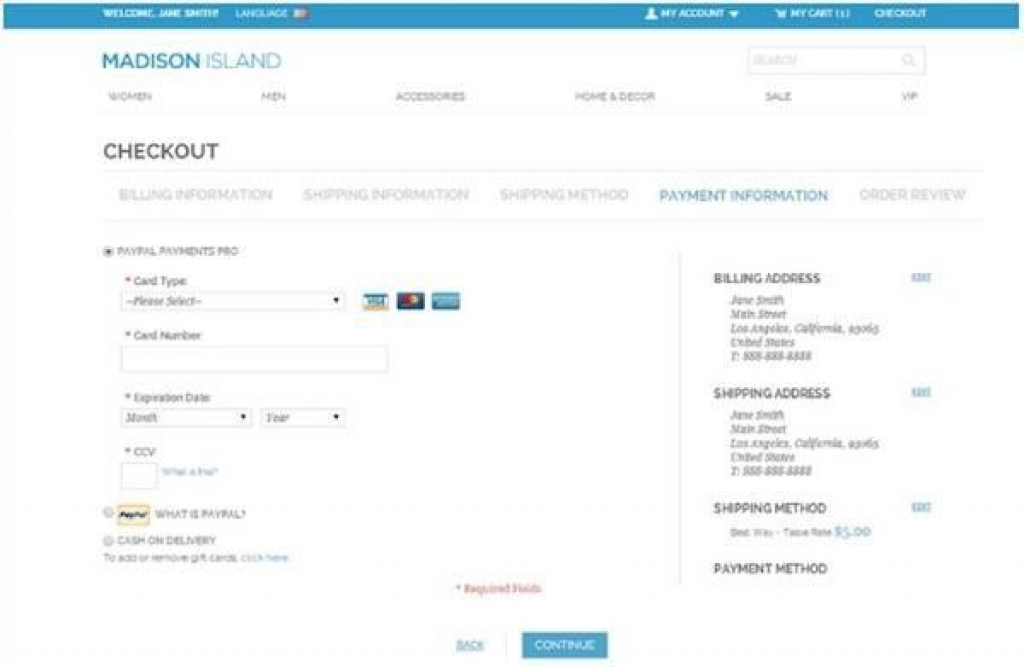
Integration with PayPal and Authorize.net makes things easy, and the entire shopping cart is built to work with and display tax and shipping calculations. In short, shipping, payments, and an integrated checkout come built into each Magento version. There’s no need to upgrade to Magento Commerce to get the best payment processing support.
Security
If something happens to your site, Magento offers services to resolve the problem. They actually have an entire Security Center dedicated to that task. For example, Magento charges from $1,000 to $5,000 for SQL injection vulnerabilities.
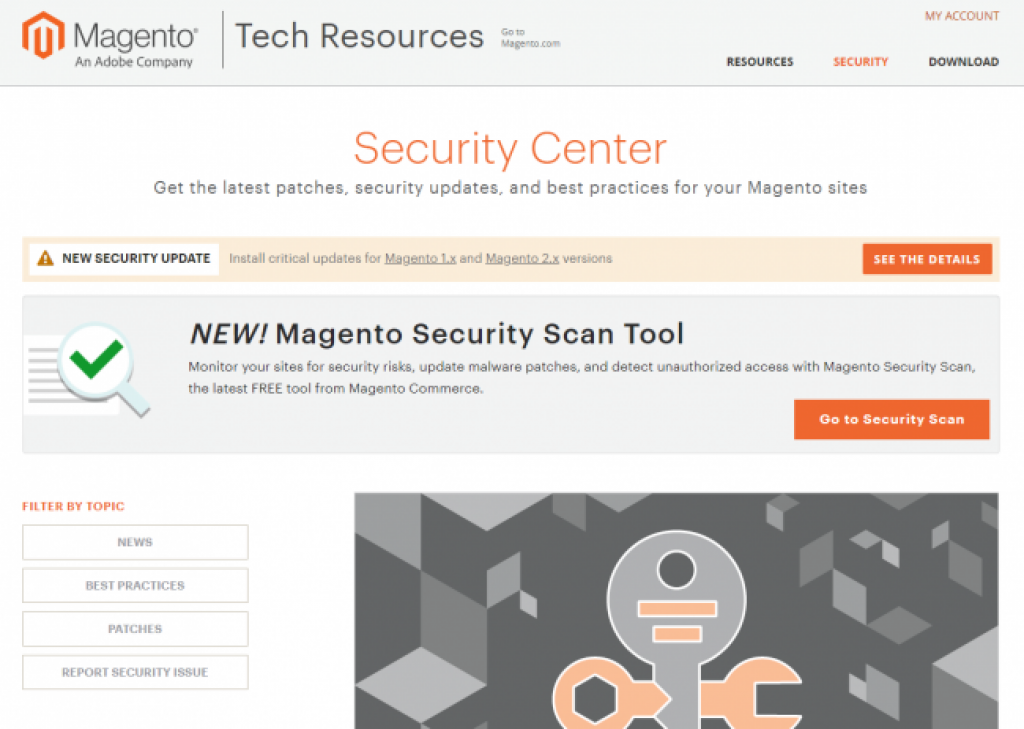
That’s a hefty, but solid service. But what about preventing these types of problems before they happen? Well, the system is just about the best you can get in terms of protecting your company and customer information. Feel free to add an SSL certificate, and execute a two-step authentication process for keeping people out of the backend of your site. All Magento sites are expected to be PCI compliant, so customer information is not stored or passed around without their knowledge.
Customer Support
You can’t go wrong with Magento support. The website is filled with various resources for both business and technical questions. Along with an informational blog, Magento has a knowledge base, forums for chatting with other users and all the resources you need to complete your own research.
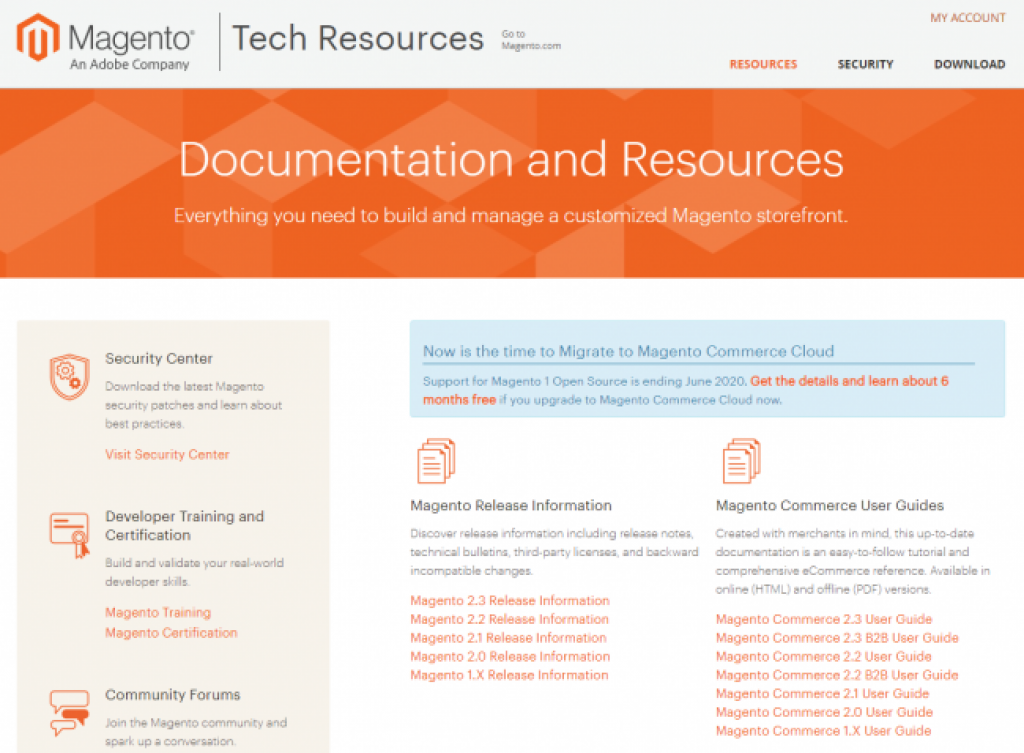
As for dedicated support, you shouldn’t expect much from Magento. It’s an open source solution, meaning you typically don’t get anything in terms of live chat, phone, or email support. You can contact Magento over the phone or email, but it’s only supposed to be for sales questions. Most of the people you get on the phone are going to be salespeople who are trained to get you signed up for Magento Commerce–not to help you out with a downed website.
Pricing and Plans
| FREE TRIAL | Available |
| MAGENTO COMMERCE STARTER | Starting at $2,000/month |
| MAGENTO COMMERCE PRO | Starting at $3,417/month |
Magento offers two enterprise pricing packages. The final price depends on your store’s average order value and expected annual online revenue. A 30-day free trial lasts from the date of account creation. You can contact the vendor for more details.
Magento Commerce Starter – starting at $2,000/month
- Promotions and Pricing
- Search Engine Optimization
- Site and Content Management
- Catalog Management
- Catalog Browsing
- Product Browsing
- Checkout and Payments
- Shipping
- Order Management and Customer Service
- Customer Loyalty
- Customer Accounts
- Support for Global Sites
- Analytics and Reporting
- Layout and Theming
- Cloud hosting & deployment
- 24×7 email support
- Business Intelligence
Magento Commerce Pro – starting at $3,417/month
All Starter features, plus
- High availability infrastructure
- Dedicated hardware
- Dedicated launch manager
- Integrated B2B functionality that includes:
- corporate account management and support
- customized catalogs and price lists
- tools for rapid ordering
- online requests for quote workflow
- increased inventory visibility across retail outlets
Competitors
WooCommerce: WooCommerce is an open-source e-commerce plugin for WordPress. It is designed for small to large-sized online merchants using WordPress. Launched on September 27, 2011, the plugin quickly became popular for its simplicity to install and customize and free base product.
Pinnacle Cart: Pinnacle Cart is a leading hosted ecommerce software platform that provides a robust all-inclusive online store builder that allows you to custom design an online store, manage product catalogs, create marketing campaigns, and collect web analytics and so much more. Pinnacle Cart also caters for international customers since it supports multiple languages and currencies. They offer free migration from over 40 different shopping carts, as well as design and SEO services. They offer a free trial for 14 days where no fees and no credit card are required. Pinnacle Cart’s cheapest ecommerce software plan is 19.99 per month.
Payability: Payability is an American FinTech company based in New York City. Payability provides finance solutions to suppliers of digital marketplaces. Payability’s platform integrates with digital marketplaces, most notably Amazon’s. The company offers customers invoice factoring: It purchases suppliers’ accounts receivable, allowing suppliers to get paid for their sales on an expedited schedule. Payability accelerates publisher payments across a variety of ad networks, affiliate networks and app stores. Sign up couldn’t be simpler: connect Payability to your accounts, choose payment cadence, and start receiving payments directly to your bank account as early as tomorrow.
WedgeCommerce: WedgeCommerce is an e-commerce platform that lets Salesforce users build and manage native online stores that operate within the Salesforce environment and integrate their commerce and CRM with a beautiful storefront and very manageable backend functionalities. With this e-commerce solution, Salesforce users have a platform that they can leverage to effectively and efficiently run a personalized and fully independent self-service portal that greatly impacts buyer acquisition and retention. Parading a plethora of useful, powerful features like integrations with popular payment gateways, single page checkout, social media sharing, and multiple product type support, WedgeCommerce has all that you need to create and run a native Salesforce online store.
Summing Up
According to an Alexa study, Magento is used on 20% of all ecommerce sites online. That’s pretty impressive! One of the reasons for this is because of Magento’s flexibility and expandability. You can add just about any type of feature to your site–and that’s why so many large and fast-growing businesses opt for Magento.
Ecommerce solutions usually come in one of three forms: Built for people with no programming experience, some experience, or lots of experience. Magento falls in the category for people with professional web development experience, and although intermediate level developers can most definitely handle Magento, it’s generally implemented by medium to large ecommerce sites with some cash to spend on a web person or department.
It’s estimated that Magento is used on 20 percent of all e-commerce sites online. Under the hood, Magento works in either of two ways:
- it’s available as a free download – this means that you can download it from the official website and install it on your own server,
- it’s available as a hosted service – this means that you don’t have to install anything yourself, but there’s also a much higher price tag.
Magento is your all-in-one solution for e-commerce, offering a ton of features with basically nothing missing from the platform. That being said, it’s a fairly advanced piece of software engineering. It’s going to be nearly impossible to use it if you don’t have web development experience or don’t employ anyone who does.